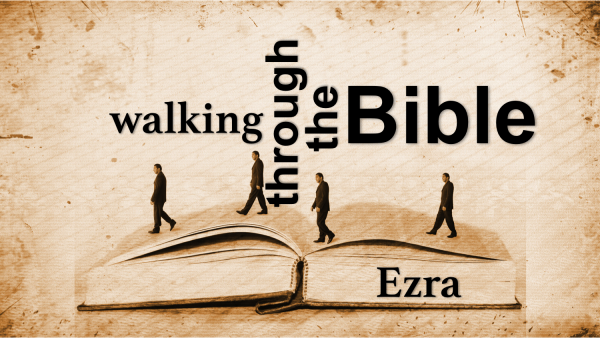The book of Ezra continues the chronological progression of the Old Testament that began all the way back in Genesis. Thus far has been recorded the creation of the universe and man in it, the beginning of Israel and their bondage in Egypt, Israel’s exodus from Egypt and eventual forty year wandering in the Sinai wilderness, their conquer and habitation of the land of Canaan promised so long ago, the prosperity of the kingdom leading up to its divided demise, and then their long awaited captivities in Assyria and Babylon. At the end of II Chronicles the southern nation of Judah who had been exiled to Babylon were then proclaimed free to return home by the now reigning Cyrus of Persia. The closing words of II Chronicles are almost word for word similar to those found in Ezra 1:1-2 where it was written, “Now in the first year of Cyrus king of Persia, that the word of the Lord by the mouth of Jeremiah might be fulfilled, the Lord stirred up the spirit of Cyrus king of Persia, that he made a proclamation throughout all his kingdom, and put it also in writing, saying, Thus saith Cyrus king of Persia, The Lord God of heaven hath given me all the kingdoms of the earth; and he hath charged me to build him an house at Jerusalem, which is in Judah.” So now it is 536 B.C. Judah had been in Babylon for seventy years, as promised by God. However now it is time for them to go home.

The Book of Return
If the heart of Cyrus was stirred by the Lord to release Judah, by what means might that have been accomplished? Over two hundred years before Cyrus was born, Isaiah had written of one to come that would proclaim freedom for the children of God: “That saith of Cyrus, He is my shepherd, and shall perform all my pleasure: even saying to Jerusalem, Thou shalt be built; and to the temple, Thy foundation shall be laid” (Isaiah 44:28). It is possible, as believed by most scholars, that Cyrus at some point read this prophecy that called him by name, and the power of God’s omniscience stirred Cyrus to proclaim freedom unto the people.
However, it was in 536 B.C., seventy years after the first departure into Babylon, that the first of three groups of Jews returned to Canaan. The first group of approximately 50,000 was led back by Zerubbabel as recorded in Ezra 1-6. This group began work on the temple upon their arrival, but after laying the foundation the work laid dormant for many years. Then in Ezra 7, Artaxerxes, the successor to Cyrus, commissioned a scribe by the name of Ezra to lead another willing group back home. At this time, around 458 B.C., Ezra led some 1,750 Jews back. Then about thirteen years later, Nehemiah returned with a few more Jews, at which time the wall of Jerusalem was rebuilt. As relating to the narrative of Ezra, the first two returns are recorded in addition to the temple work.
There is no doubt in most true Bible students’ minds that this book is ascribed to the one whose name it bears. In fact Ezra is believed to be the author of both this book as well as I and II Chronicles. There is no substantial evidence to deny this long-standing claim, and thus Ezra is recognized as the author.
The purpose of Ezra’s writing this book revolved around one main point: God’s faithfulness. After God had sent His children into Babylon so many years earlier, He had sent Jeremiah with the message that they would return. “The word that came to Jeremiah from the Lord, saying, Thus speaketh the Lord God of Israel, saying, Write thee all the words that I have spoken unto thee in a book. For, lo, the days come, saith the Lord, that I will bring again the captivity of my people Israel and Judah, saith the Lord: and I will cause them to return to the land that I gave to their fathers, and they shall possess it” (Jeremiah 30:1-3). Just as surely as they went in God said they would come out. Ezra wrote to prove that just as God always had been true to His word, so would He be regarding their release. And true to His word He was, because all who so desired were allowed departure to return home.
A problem that might arise from one’s reading Ezra is the meager mentions of Ezra himself. Unlike other books of the Old Testament thus far written in which the author is prominently mentioned, Ezra’s account is more historical than autobiographical. In fact the first sixty percent of the book’s focus is on the work of a different man altogether named Zerubbabel. But Ezra did not write to inform people about his life and work, but to inform people about Israel’s return and the circumstances that revolved around it.
Christ is pictured in Ezra in two distinct ways. First of all He is seen through relation. Zerubbabel, who led the first group of captives home, was the grandson of Jeconiah, and is mentioned in Matthew 1:12-13 as one through whom the Christ came incarnate. But also, Ezra’s record is an account of God’s fulfilling promise unto His children as part of the ongoing process of redemption coming into the world, ultimately through Christ.
Ezra is a book of great purpose and power to the student of the Bible in attempting to grasp the connection of the Bible as a complete book. Its continued history and proof of God’s word aid greatly in our understanding of God’s redemptive scheme.
-Andy Brewer
